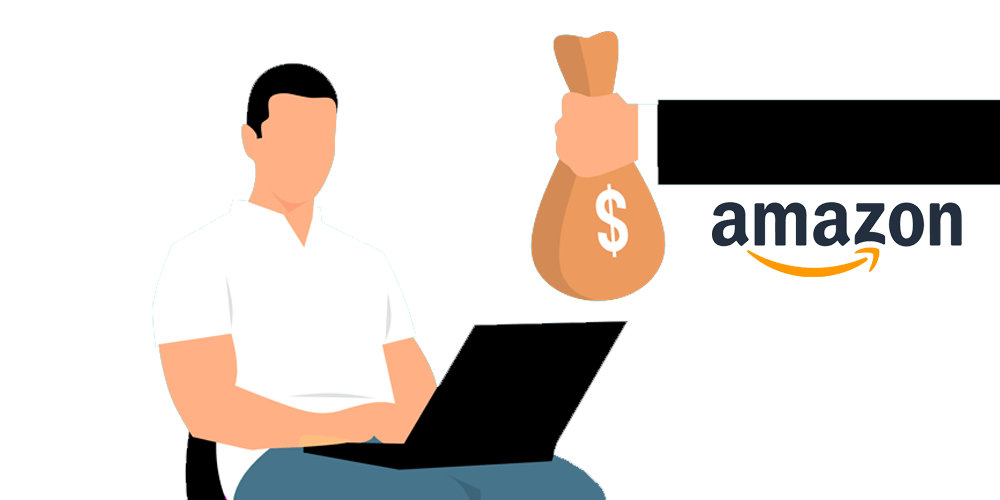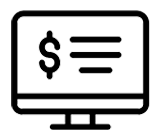On this page, I’ll summarize how Richard and I recently sold our Amazon FBA brands.
I’ll discuss how we have invested 100+ hours of research into potential buyers of online businesses, including Amazon aggregators.
Finally, I’ll point you to our database of over 150 aggregators, with free access to its simple 3-step buyer search.
This will reveal a list of buyers that are most likely to make you an offer and, crucially, give you the highest valuation for your business.
All in less than 2 minutes.
After that:
If you wish to hear the longer version of Richard’s exit story, his recent chat with Danny McMillan on the Seller Sessions podcast is available on YouTube.
Let’s get started.
It’s time to cash out
For some reason, people equate ‘selling physical products on Amazon’ to something you do in your spare time out of your garage, to make “a few extra bucks”.

Or even worse:
You’ve had to justify to friends and family why this is a real business, and not another “get-rich-quick scheme”.
We’ve all been there.
But after years of hard work – blood, sweat, and many (many) tears – you’re finally ready to cash out.
And the best bit?
It’s NEVER been a better time to sell your Amazon business. Just like Richard and I (Martin) did, a few short months ago.
So whether you’re new to the world of Amazon exits, or a seasoned veteran with multiple business sales under your belt, we are here to share our experience.
Buyers look for different things in a business.
Click to compare 150+ Amazon Aggregators to secure your highest offer.
How we started
Having successfully completed the very first ‘Amazing Selling Machine’ (ASM) course in 2013, I thought Amazon FBA would be easy money compared to my former profession as an accountant.
Richard started on Shopify and did not join ASM, but could see the massive potential of Amazon too.
Thousands would be coming in every day, 100% on autopilot with minimal effort and maximum profit.
Right?

Wrong.
It wasn’t easy money. Not by a long shot.
As a matter a fact, it was a daily grind.
Of course:
We did generate an incredible number of orders every day – often on autopilot – but it took years of work, frustration, and perseverance to get there.
But as a successful Amazon FBA seller yourself, you already know that.
Why did we both sell up?
Well:
After more than 7 long years of sweating it in the Amazon trenches, something magical happened.
Sometime around the middle of 2020, we both started receiving messages from prospective buyers. These were companies that had raised, according to TechCrunch, etc, vast amounts of cash to spend on acquiring Amazon FBA businesses.
At first, it was just a trickle of solicitation emails – maybe one or two a month.
But then:
As 2021 kicked into gear, that trickle turned into a torrent of weekly messages from companies all over the planet.
Each one claiming to have been monitoring the performance of our brands and keen to “have a conversation” about the prospect of selling them.
It was flattering and, if truth be told, a little intimidating – in equal measures.
Slowly, but surely, word got around within the Amazon seller community, fuelled by a flurry of blog posts and podcasts featuring multi-million dollar exits.
Eventually, a name was given to these companies that were changing the face of our industry – Amazon aggregators.
The idea was simple:
Buy up (or aggregate) multiple smaller FBA brands, with the intention of either flipping them after a few years or holding out for an IPO.
Buyers look for different things in a business.
Click to compare 150+ Amazon Aggregators to secure your highest offer.
Our Amazon businesses
Whilst we are good friends, we have always had completely separate FBA businesses.
Richard:
Created a wildly successful nutrition and wellness brand, selling primarily on Amazon UK and across Europe. His products frequently gained sub-100 Best Seller Ranks and were featured in multiple mainstream media.
I (Martin):
Focused my attention on the skincare niche in America. Hitting the ground running during the ‘gold rush’ of 2013 / 2014, I eventually headed back across the Atlantic and cultivated one of the biggest private label skincare brands on Amazon UK, Italy, and Germany.

Richard (left) and Martin (right), standing outside a massive castle in England, trying to look cool and successful☝️ We hired this place and hosted a mastermind, catching up with other post-exit sellers to share stories of all things Amazon.
Buyers look for different things in a business.
Click to compare 150+ Amazon Aggregators to secure your highest offer.
Being an Amazon seller
Our achievements do, on paper, sound fairly impressive. And if we’re being honest, we are extremely proud of the brands we created.
But here’s the truth:
The selling on Amazon game has gotten progressively harder over the past couple of years.
We are, after all, just two regular guys, each with just a small team to help with operations. And if you’re anything like us, you will know that it doesn’t take much for the workload to become overwhelming.
Especially when dealing with Amazon.
Whether it’s restock limits, shipping prices, stock shortages, seller performance, product safety and compliance, insurance, reviews, launches, dodgy competitors, and so on.
Not a week has passed in recent years without something hitting the fan.

And yet:
For all its worry and irritation, the Amazon FBA business is still a very (very) lucrative one.
It is for this reason that so many large companies are now entering the space, keen to carve out their own piece of the pie and reward the loyal investors that have backed them.
Buyers look for different things in a business.
Click to compare 150+ Amazon Aggregators to secure your highest offer.
Selling our FBA brands
How did we sell our brands?
Well, despite our reservations about the challenges of finding the right buyer, the horror stories of due diligence, and the prospect of “getting screwed over”, it was actually a fairly straightforward process.
Once we had decided to focus on selling directly to an aggregator, that is. And also what type of deal we were willing to sign.
But here’s the kicker:
What did take time was the research into every Amazon aggregator that had contacted us, plus the many more that did not.

Each one had a different preference of product category, number of ASINs, Amazon marketplace, Amazon sales, Shopify sales, total revenue, margin threshold, and so on.
It was no small task
Yet after many weeks of research, emails, telephone calls, follow-ups, etc, we had accumulated a valuable database of practically every Amazon aggregator in the public domain.
What did help was that we both sold our Amazon businesses at the same time, albeit to different aggregators.
Richard was fortunate to have an investor who was a senior M&A (Mergers & Acquisitions) expert. He joined every meeting and was able to share his experience.
For the most part, I relied on my prior background in audit and accountancy to assist in getting my business ready for sale.
All in all, however:
It was a relatively stress-free experience for us both.
In fact:
From initial contact with each aggregator to closing, our deals were done and dusted in 6-8 weeks.
Boom!
Not bad when you consider that some business sales – with smaller valuations – can take up to 12 months to complete.
Buyers look for different things in a business.
Click to compare 150+ Amazon Aggregators to secure your highest offer.
Why this website?
I think you can agree:
The events of the past two years have been challenging, there’s no doubt about that.
We have navigated Covid, Brexit, restock limits, and all the usual twists and turns of being an Amazon FBA seller.
It’s been an emotional rollercoaster for everyone in our industry.
For us personally, the process of selling our respective businesses was all-consuming, but boy did we pick a ton of valuable experiences along the way.
This leads me to:
The purpose of this website
You see:
Both Richard and I find ourselves in a fairly unique position.
Not only are we still two of the most active members in the Amazon seller forums, but we also have:
-
- A comprehensive database of every Amazon aggregator out there
- First-hand experience of selling to an Amazon aggregator in 2021
- Direct access to key decision-makers in multiple top aggregators
- 15 years of collective experience running an Amazon FBA business
Since the news of our exits has circulated, we have been inundated by other sellers keen to tap into our experience.
“How did you sell your Amazon business so quickly?” is probably the most common email in our inbox.
Fun (but sad) fact:
I now put my cell phone in a safe every night to prevent myself from checking the seller WhatsApp messages after 9 pm!

And so:
After some ‘gentle’ persuasion from our friends in the Amazon community (you know who you are!), we decided to start this website.
If you are new here, we recommend you check out the common questions section first.
This covers all of the key information on how to sell your Amazon business, plus the things you may not have thought to ask.
It also includes:
The invaluable advice from Richard’s professional M&A advisor, and some little-known tips and tricks from our friends in the community who have also recently sold to aggregators.
How to sell your Amazon business
If you want to sell your Amazon business in 2024, the quickest and (most likely) highest offer will come from an Amazon aggregator.
Each aggregator, however, is looking for something slightly different.
Some buyers place more value on USA sales, whilst others prefer a mixture of USA and UK/EU.
Additional revenue streams from the likes of Shopify and eBay can be attractive to certain aggregators, whereas others want 100% Amazon sales only.
Of all the Amazon aggregators we have spoken to – which is 95% of the market – they each have preferred product categories.
And with acquired brands already in those niches, they are more inclined to offer higher valuations for businesses in those categories.
Now it’s your turn:
Once you are ready to take the next step, click on the red find buyers button below.
This will take you to our simple, three-step quiz – the culmination of over 100 hours of research into the Amazon aggregator space.
It will also reveal the buyers that are most likely to make you an offer and, crucially, give you the highest valuation to sell your Amazon business.
We look forward to hearing from you.
Richard and Martin
Buyers look for different things in a business.
Click to compare 150+ Amazon Aggregators to secure your highest offer.








